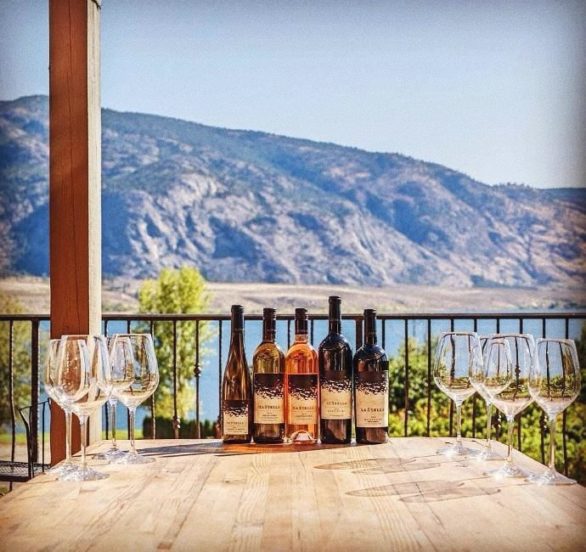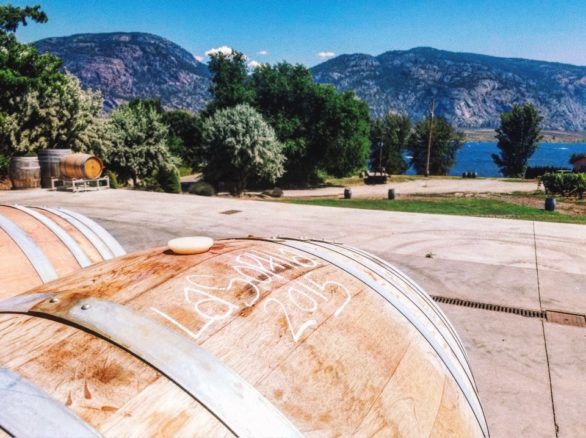September 2021 | Education, General, Okanagan Valley
Sustainability at LaStella Winery – Part III
Sustainable Winery Program
Sustainable Winegrowing British Columbia (SWBC)’s Sustainable Winery Program implements top-of-class winemaking standards. This helps wineries expand their businesses, improve the livelihoods of employees and their families and connect to and with their communities, with sustainability in mind.

Like the Sustainable Vineyard Standard, the SWBC Sustainable Wineries Standard is based on the principle that sustainability is a path, not a destination. Consequently, a sustainable winery, in this sense, continually improves, pursues new opportunities, mainstreams what works, and adjusts to the SWBC Winery Standard.
To meet the SWBC’s Sustainable Winery Standards, the essential criteria include:
- Set a Sustainable Foundation
- Water Efficiency and Conservation
- Energy Efficiency and Management
- Responsible Waste Management
- Climate Action
- Social Equity
Sustainable Practices at LaStella Winery
Every decision has an impact on the final quality in the glass we serve in our tasting rooms. Hence, we have had years of careful thought and planning, in the winery as well. With that in mind, we have implemented a few programs that has helped us to achieve this certification:
- Standard Operating Procedures (Water Efficiency and Conservation)
We have many operating procedures in place for barrel cleaning, batonnage and the list goes on. We use oak fermenters (vats) and concrete fermenter tanks with a cap to age our wines so that they do not need to be replaced as often. Barrels often need to be replaced every 7-10 years or so, but large oak vats last many lifetimes. Our barrels are swelled using the barrel washer and very hot water then bunged for quick swelling. We choose this way over the traditional method of filling fully with water and bunging as a conscious approach to minimizing water consumption. - Waste Management Plan (Responsible Waste Management)
This Plan includes onsite recycling and garbage that is picked up twice weekly. We also work with the Bottle Depot to deposit used bottles since we open at least 500+ bottles a year for tasting room samples. Corks are kept and recycled. All cleaning supplies are earth-safe and eco-friendly too. As per our tasting room, LED lights and motion sensor are installed for energy conservation. We try to waste as little paper or gas and find sustainable ways to dispose of our waste at the winery and by keeping our property in tip top shape. We follow Amorim Cork’s Sustainability Guides closely as well to continue improving our waste management strategies and reduce waste. - Investing in Capital (Setting a Sustainable Foundation)
We are constantly investing in our capital to set a sustainable foundation and be sustainable in the long run. Lately, we have replaced our existing humidifier to decrease wine evaporation and water consumption. Our winery also invested in a Vivreau System so that we can serve our guests sparkling water whilst eliminating our purchase of bottled water to reduce the number of bottles at the winery.
These programs have met the criteria required for the Sustainable Vineyard Standard and LaStella Winery successfully completed a Certification Audit that ensures all SWBC standards were adhered to this year.

We are delighted to celebrate this achievement with everyone. We know that when achievements are shared, waves of impact from these decisions, programs and continuous improvement go beyond the winery industry for generations to come!
Quotes from Members of Staff: What it Means to be Sustainable
“I feel so grateful to be part of such a caring and hard-working team who want to protect our world from harmful waste and reduce our carbon footprint while also producing delicious wines. We are experiencing the impact of pollution through climate change more than ever now and I feel excited and proud for LaStella to be officially acknowledged as Sustainable”
“We’re doing our best to treat the environment with respect and purpose while producing the cleanest product we can”
Written and Edited by Nicole Lee